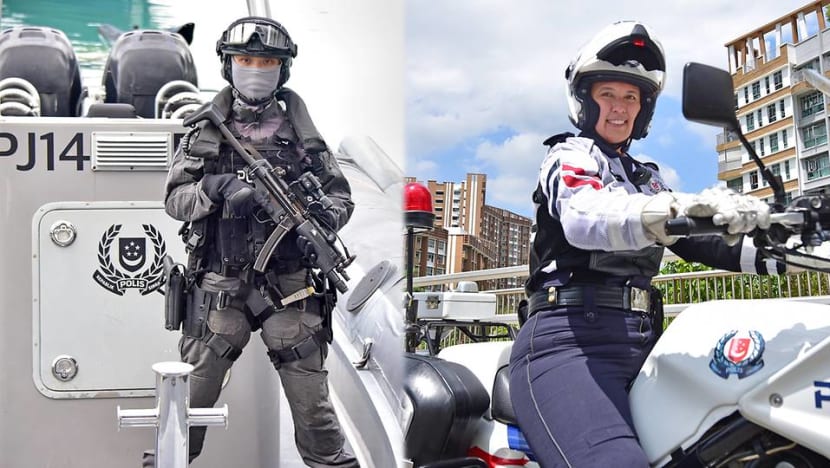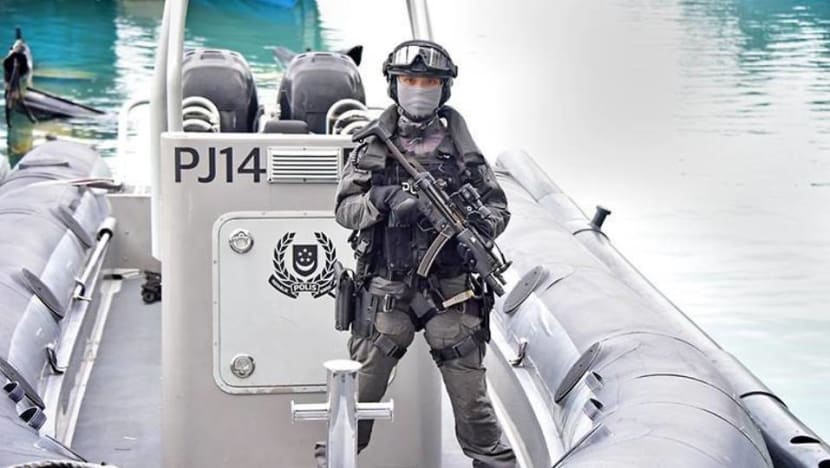‘We’re treated as equals’: Women officers in SPF
As the Singapore Police Force marks 70 years of women in policing, Channel NewsAsia speaks to two female officers who have earned their stripes.

Sgt Fiona from the Police Coast Guards’ Special Task Squadron and Traffic Police officer Nur Hafizah Harun. (Photos: Gaya Chandramohan)
SINGAPORE: When Traffic Police officer Nur Hafizah Harun stopped a driver for a speeding offence along the Ayer Rajah Expressway (AYE), the first words she heard from the man behind the wheel were: “Wow, a female officer?"
“Why can’t a female officer be on the road?” she asked, to which he replied: “Female officer can ride big bikes?”
She recalls smiling politely in response.
The 28-year-old Staff Sergeant (SSG) has been with the Traffic Police (TP) for seven years and is all too familiar with such a reaction, though she says no one has tried to flirt their way out of a ticket just yet.
“The biggest stereotype that I always hear is that female officers cannot ride big bikes. That is not true. We can ride big bikes and we are trained to ride these big bikes, the same as the other male officers,” she told Channel NewsAsia.
SAME, SAME BUT DIFFERENT
SSG Hafizah is one of 1,800 policewomen in the Singapore Police Force (SPF) today. They make up 19 per cent of the force, which has a come a long way since introducing women into its ranks as an experiment in 1949. Back then, just 10 female police officers were enrolled as members of the Special Constabulary (Active Unit). There are now no roles or rank within the force which women cannot attain, the SPF states.
READ: The riot squad: How the Police Tactical Unit keeps the peace
“Even though I work in a male-dominated environment, everything else is the same because we are all treated as equals,” SSG Hafizah said. Like her male counterparts, she spends up to 10 to 12 hours on the road daily while out on patrol.
She credits a senior female officer for “changing the game” in the TP by advocating to take a Class 2 motorcycle licence many years ago. “When I saw her riding big bikes, I also wanted to operate one. Eventually, I took up my own licence,” said SSG Hafizah who joined the force after graduating with a diploma in Business Applications from Republic Polytechnic.
She was particularly impressed by a fellow petite officer who handled larger motorbikes with ease in a TP pilot. “I told myself: if she can operate these machines and lift up these bikes, why not me?”
She was also inspired by their decision to further their studies despite the long hours of the job, and is pursuing a part-time degree in Human Resource Management and Security Studies.
WIFE, MOTHER, STUDENT AND OFFICER
The young mother of one travels twice a week from the Traffic Police headquarters in Ubi to Clementi to attend evening classes. Due to the nature of her job though, SSG Hafizah has had to occasionally skip classes and even exams.
During last year’s Trump-Kim summit in Singapore, SSG Hafizah had to skip classes as she was deployed to single-handedly effect a road closure and lift it. She reported to the station at 6am and manned it until 8pm, returning for another shift at 2am.
READ: ‘Often we work cases for 36 hours without sleep ... but we’ve to answer to the public’: Police award winner
Her husband, also a TP officer, was involved in summit security as well, so their baby was left in the care of other family members.
“We found it hard because our son was only seven months old back then. He required our full attention and it broke my heart to leave the house when I heard him crying at 2am in the morning.”
She added: “As a policewoman, one of the sacrifices I have had to make is to miss my son’s milestones. I missed his first steps and only managed to see him walking through the video that my mother sent me while I was at work.”
It is not just her family that she misses because of irregular work hours. “I also hardly meet up with my friends for a gathering or dinner because they are working an office job while I am working in a shift job,” she said.
“Despite the sacrifices, at the end of the day, my satisfaction is to keep Singapore’s roads safe and to bring errant road users to justice.”
TOUGH AS THEY COME
Another female officer making her mark is *Sergeant Fiona (*not her real name) - the youngest of three women from the pioneer batch of female officers in the Police Coast Guards’ Special Task Squadron (STS).
Intercepting maritime threats with a high-speed boat, jumping into deep waters to capture assailants, and pinning down aggressors twice her size is all in a day’s work for the 31-year-old.

“We had to go through a very intensive hell week. There’s no difference between female and males (in training). Whatever the guys did, we have to do as well. So things like carrying weights, running or even climbing with it, no different, no discount,” said SGT Fiona on the gruelling selection tests she had to go through.
She told Channel NewsAsia she joined the STS because of a desire to help and protect people. But her mother, while eventually supportive, had expressed concern when she first learnt her daughter wanted to join the elite unit.
“When coming to STS, I told her what the job was like and she said: ‘Can don’t want or not?’,” recounts SGT Fiona, laughing.
“(But) I told her not to worry and that everything will be okay. My mum supports whatever I want to do. She won’t stop me.”
“I WAS CHALLENGED … AND I PROVED THEM WRONG”
SGT Fiona, who stands at a petite 160cm, says her six-month training stint helped her build mental and physical resilience.
“I had to go through everything, like carrying weights, putting all the equipment on me and working well with it. At the start, it was so difficult because the weights were about 100kg, including my own weight. We had to run and do whatever we’re told with our equipment almost every day.
“Once, I couldn’t catch my breath and hyperventilated. It was one of the toughest times I had during training.”
READ: Female martial artists in Singapore fight hard to make progress against stereotypes
Scepticism from some of her male peers made her all the more determined to do well.
“There are some guys who will take you as a challenge, like: ‘They are girls, I cannot lose to them’,” she said.
“But eventually, the culture changed. I was challenged before. No issue, took up the challenge and proved some of them wrong. It actually motivated some of the guys and they joined us and they managed to pull through and they are proud of themselves as well.”
She added: “They have this mindset that ‘She knows what she is doing; she has to do it and she will do it.’ They actually trust us to do the job well, and now there’s no stereotyping at all.”
After being on the job for three years, the rigours of becoming an STS officer have become second nature to her.
“I’m slowly getting better and won’t hyperventilate anymore. I learnt to catch my breath and know how to control basically anything, including my aggression. It’s a very important part of it,” SGT Fiona said.
"Challenges come every day. Once you complete a challenge, a new challenge comes.”














